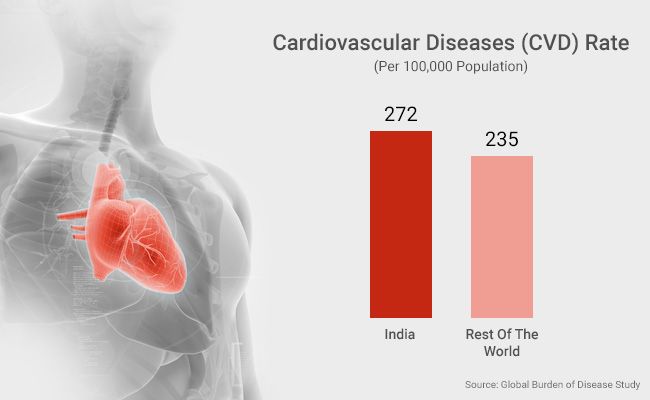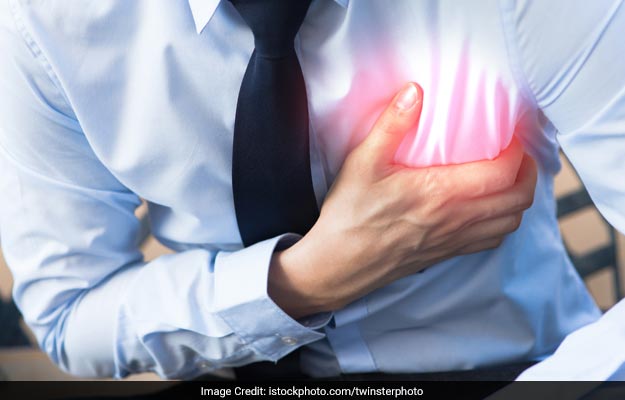India is a fast growing country, not only in terms of the economy but rather sadly, also when it comes to the spread of diseases. It is the third ranked country in the world, for having the most number of obese and overweight people. The gradual increase of urbanization in India has led to a simultaneous increase in pollution, global warming and other environmental hazards. With such environmental and life factors affecting our health daily, India accounts for nearly six million deaths per year due to cardiac arrest or heart attack. Many of those hitting late 30s or early 40s, often experience slight chest pain or hand numbness which is later blamed on the daily work stress. Well, here's a reason why that mini stroke should never be ignored. According to a study, people who suffer mini-strokes are more likely to suffer a major heart attack.Doctors revealed recently that people who have once suffered a mini heart stroke are at a higher risk of suffering a major stroke in the near future and if not provided with immediate medical care, the patient may lose 1.9 million neurons, also called nerve cells. Dr. Vipul Gupta, Director, Neurointervention, Artemis Hospital, Gurugram said, "Over 40 per cent of the people who have had a mini-stroke are prone to have a regular stroke within three days. It happens when blood flow to part of the brain is blocked or reduced, often by a blood clot. After a short time, blood flows again and the symptoms go away." Doctors have recommended immediate medical attention and care for such patients and switch to a healthier way of living.The age at which heart attack is experienced the most is nearly around 50 to 60 years of age and the chances increase with age. Men at a younger age are at twice the risk than women to have a mini-stroke. It was also observed that women with a history of mini-strokes and also suffering from migraine are three times more likely to have a stroke within a week. "Every two seconds, someone has a stroke, and unfortunately, many do not receive proper care, due to lack of recognition. Even if a person had a mini-stroke and the symptoms have gone away, they still need to call the doctor right away," said Dr. Satnam Singh Chhabra, Head Neuro and Spine Surgeon, Sir Ganga Ram Hospital.
 Neither symptoms of having a weak heart nor mini-strokes should be taken lightly. It is a warning sign board with “caution” written on it. Dr. Chhabra said, "Early recognition makes a big difference and can lead to unbelievable outcomes during treatment, but many people delay going to the hospital because they do not recognize the symptoms." Cognitive impairments like confusion is also often experienced by few people explained the doctors. "Loss of vision accompanied by severe headache may also be a symptom for the start of stroke. The golden period of a stroke are the first six hours and urgent treatment is the key," said Dr. Chhabra.
Neither symptoms of having a weak heart nor mini-strokes should be taken lightly. It is a warning sign board with “caution” written on it. Dr. Chhabra said, "Early recognition makes a big difference and can lead to unbelievable outcomes during treatment, but many people delay going to the hospital because they do not recognize the symptoms." Cognitive impairments like confusion is also often experienced by few people explained the doctors. "Loss of vision accompanied by severe headache may also be a symptom for the start of stroke. The golden period of a stroke are the first six hours and urgent treatment is the key," said Dr. Chhabra.
India has reported nearly 70 million heart attacks in a year resulting in approximately six million deaths. 26 million stroke survivors are left living with significant disabilities that hinder their ability to carry out daily living tasks which are essential for surviving. Poor lifestyle habits, lack of cardio vascular activities, high cholesterol, and high blood pressure are among the main reasons which lead to mini-strokes. Dr. Chhabra concluded, "When blood pushes too forcefully against the walls of the arteries, it can damage or weaken them and lead to stroke. Unhealthy eating habits and lifestyle (physical inactivity) leads to Cardio Vascular Diseases, diabetes and builds up cholesterol which can block blood flow to the brain”With inputs from IANS

India has reported nearly 70 million heart attacks in a year resulting in approximately six million deaths. 26 million stroke survivors are left living with significant disabilities that hinder their ability to carry out daily living tasks which are essential for surviving. Poor lifestyle habits, lack of cardio vascular activities, high cholesterol, and high blood pressure are among the main reasons which lead to mini-strokes. Dr. Chhabra concluded, "When blood pushes too forcefully against the walls of the arteries, it can damage or weaken them and lead to stroke. Unhealthy eating habits and lifestyle (physical inactivity) leads to Cardio Vascular Diseases, diabetes and builds up cholesterol which can block blood flow to the brain”With inputs from IANS
Advertisement








